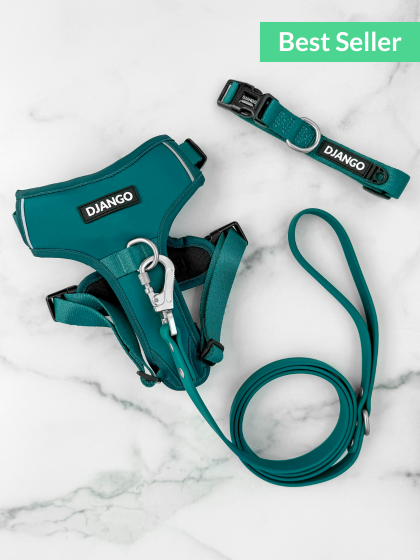Updated July 2020
Last year Mike and I (Steph) took our dachshund Django on our honeymoon to Europe. The process of taking Django abroad was complicated, time-consuming, expensive... and 100% worth it. We had a great time with Django in France and Italy and highly recommend international pet travel when it's done right!
We outlined everything our friends need to do to successfully bring their dog to Europe and also have a great article detailing every international airline's pet policy for in-cabin travel. But what about our international friends who want to take their pet to the USA? This post is for you!
Here is everything you need to do to take your dog to the USA. If you have any questions just leave us comment below!
Bringing your dog to the USA for the first time? Here’s what you need to know.
Health and wellness
Dogs may not enter the United States if they look sick or have a disease that can spread to others. This applies to all dogs including service dogs and emotional support animals. A U.S. Customs and Border Protection agent will inspect your dog to verify his/her health at the airport. If your dog looks sick or exhibits signs of illness or disease, your pup may be quarantined or denied entry entirely.
Does my dog need a rabies vaccination?
Yes. Every U.S. state requires that your dog be immunized against rabies and have a valid rabies vaccination certificate. These requirements apply equally to all dogs, including puppies and service animals.
Although the U.S. Centers for Disease Control & Prevention (CDC) only requires dogs NOT from these rabies-free countries to be vaccinated, U.S. state law overrides CDC policy.
On rare occasion, the CDC will grant a permit allowing an unimmunized dog to enter the U.S. These dog permits are given only to U.S. residents and visitors staying 30 days or more in the United States, and additional conditions must be met.
When should I give my dog the rabies vaccination?
Dogs that have never been vaccinated against rabies must be vaccinated at least 30 days before arrival. Puppies cannot be vaccinated against rabies before they are 3 months old, so the youngest a puppy can be brought into the United States is 4 months old.
A puppy under 4 months of age may be allowed to enter the U.S. without prior rabies vaccination -- this will depend on which U.S. state you are visiting, so check the respective state's pet import policy page. New Jersey, for example, allows pets younger than 4 months to enter the state without prior rabies vaccination so long as the pet owner contacts “the CDC at CDCAnimalImports@cdc.gov as soon as possible in advance of the dogs arrival to approve a confinement agreement allowing the dog entry if 2 owners agree to vaccinate the dog at 3 months of age and confine it for 30 days from the date of rabies vaccination”.
Adult dogs older than 15 months of age that previously received a rabies vaccination and that has since expired may be imported immediately after booster vaccination, without the need to wait 30 days.
What is a Rabies Vaccination Certificate and how do I get one?
Dogs entering the U.S. need a valid Rabies Vaccination Certificate. This certificate must be issued by a licensed veterinarian and applies to ALL dogs including service dogs. The certificate must include (1) Name and address of owner (2) Breed, sex, age, color, markings, and other identifying information for the dog (3) Date of rabies vaccination and vaccine product information (4) Date the vaccination expires (5) Name, license number, address, and signature of veterinarian who administered the vaccination.
This seems pretty simple. Is there any other pet paperwork I need?
Some U.S. states require a Certificate of Veterinary Inspection (CVI). We needed to get something very similar to a CVI before taking Django to Europe for the first time.
A Certificate of Veterinary Inspection, or animal health certificate, is a document issued by an accredited veterinarian confirming that your pet has been inspected, found healthy, and meets requirements pertaining to travel. The CVI details the pet's information (owner, address, breed, markings, vaccinations), states the animal is in good health, and it must be issued right before you enter the United States. For example, New York requires that all dogs flying into the state have a CVI issued 30 days or less prior to entry into the U.S.
Check with your destination state’s health department before you leave on your trip to confirm if a CVI requirement applies. If it does, schedule an appointment with an accredited veterinarian at home well before you plan on departing for the U.S.
Are there any other health requirements?
Yes, skim through these to see if they apply to you and your dog:
(1) If you are traveling from a country or region where screwworm is known to exist:
- Your must get a certificate from a full-time salaried veterinarian stating (1) your dog has been inspected for screwworm within 5 days prior to arrival in the United States
- Your dog is either free from screwworm OR was found to be infested with screwworm and was held in quarantine and treated until free from screwworm prior to leaving the region
(2) If you are traveling from a country or region where Foot and Mouth Disease is known to exist:
- Your dog's feet, fur, and bedding should be free of any excessive dirt or mud
- Your dog's bedding should be free of any straw or hay, or other natural bedding
- You should wash your pup as soon as you reach your final destination
- You should distance your dog from all livestock for at least 5 days after entry into the United States.
(3) According to the U.S. Department of Agriculture (USDA), "Collies, shepherds, and other dogs to be used in the handling of livestock and that are imported from any part of the world except Canada, Mexico, and regions of Central America and the West Indies may be inspected and quarantined at the port of entry to determine their freedom from tapeworm infection."
Can I bring my puppy into the United States?
Yes, but the minimum age requirement for dogs entering the U.S. is 4 months.
A puppy under 4 months of age may be allowed to enter the U.S. without prior rabies vaccination -- this will depend on which U.S. state you are visiting, so check the respective state's pet import policy page.
New Jersey, for example, allows pets younger than 4 months to enter the state without prior rabies vaccination so long as the pet owner contacts “the CDC at CDCAnimalImports@cdc.gov as soon as possible in advance of the dogs arrival to approve a confinement agreement allowing the dog entry if 2 owners agree to vaccinate the dog at 3 months of age and confine it for 30 days from the date of rabies vaccination”.
What happens when I arrive in the U.S.?
Upon arrival in the United States, you will be required to provide a copy of your Rabies Vaccination Certificate and/or Certificate of Veterinary Inspection to a U.S. Customs and Border Protection officer (usually located by the exit door of the baggage claim). Always carry your Rabies Vaccination Certificate with you on the airplane, just in case your luggage is delayed or lost. The U.S. Customs and Border Protection agent will inspect your dog to verify his/her health, rabies vaccination information, and make sure your dog's appearance and age match the description on the certificate.
Additional resources
Planning an international trip with your pup this year or next? Check out DJANGO's international pet travel resources:
- CDC: BRINGING A DOG OR CAT INTO THE UNITED STATES
- APHIS: BRINGING DOGS INTO THE US AND ADDITIONAL STATE REQUIREMENTS
- INTERNATIONAL AIRLINE PET POLICIES FOR IN-CABIN TRAVEL
- HOW TO TAKE YOUR DOG TO EUROPE
- FLYING WITH PETS IN-CABIN TO THE UNITED KINGDOM
- DOES MY DOG NEED A PASSPORT?
- CAN LARGE DOGS FLY IN CABIN ON AIRLINES?
- 16 TRAVEL TIPS FOR FLYING WITH YOUR DOG
Hope you found all of this information helpful! Leave us a message below if you have questions or comments, and please let us know about your own experiences traveling to the US!














6 comments
DJANGO
@JULES It’s nice to hear from you! We flew economy class when flying with our dachshund Django from Italy and to the US. Last we checked, Air France, Delta, and United Airlines do not allow pets in business class at all.
Here’s another DJANGO Dog Blog article you may find helpful (copy/paste in new browser bar:
ARE PETS ALLOWED IN FIRST CLASS AND BUSINESS CLASS?
https://djangobrand.com/blogs/news/can-dogs-fly-in-business-class
I hope this helps! If you remember to do so, please report back on which airline you ultimately book. It would be useful info for our readers! Thank you, and all the best to you and your Yorkies!
@JULES It’s nice to hear from you! We flew economy class when flying with our dachshund Django from Italy and to the US. Last we checked, Air France, Delta, and United Airlines do not allow pets in business class at all.
Here’s another DJANGO Dog Blog article you may find helpful (copy/paste in new browser bar:
ARE PETS ALLOWED IN FIRST CLASS AND BUSINESS CLASS?
https://djangobrand.com/blogs/news/can-dogs-fly-in-business-class
I hope this helps! If you remember to do so, please report back on which airline you ultimately book. It would be useful info for our readers! Thank you, and all the best to you and your Yorkies!
Jules
What class did you fly in traveling back to the US?
We are getting ready to travel back shortly with two yorkies and would love to fly business with them.. Turkish airlines is the cheapest right now and they allow dogs in business class along with the higher priced Lufthansa..
any info would be helpful
Thanks
What class did you fly in traveling back to the US?
We are getting ready to travel back shortly with two yorkies and would love to fly business with them.. Turkish airlines is the cheapest right now and they allow dogs in business class along with the higher priced Lufthansa..
any info would be helpful
Thanks
DJANGO
@LISA Hi Lisa! Thank you for taking the time to write such an informative comment. You are absolutely correct that the CDC does not require rabies vaccination certificates for dogs entering from certain rabies-free countries BUT — and this is a big BUT — state pet import policy will override the CDC’s policy. Every state policy is different, so it is important to check the individual state’s pet import page and confirm their policy on rabies vaccination history. We included this detail above, but it’s definitely an important one to stress when considering travel to the US with a dog or cat.
Regarding pet age, every US state’s pet import policy is unique, so it’s definitely important to confirm the policy of the state you are traveling to. New Jersey, for example, allows pets less than 4 months to enter the state without prior rabies vaccination so long as the pet owner contacts “the CDC at CDCAnimalImports@cdc.gov as soon as possible in advance of the dogs arrival to approve a confinement agreement allowing the dog entry if 2 owners agree to vaccinate the dog at 3 months of age and confine it for 30 days from the date of rabies vaccination”.
Thanks again for the useful comment! We include a link to the CDC’s dog import policy page under “Additional Resources” above. We also link to APHIS’ resource with each state’s pet import policy page — just scroll down to the bottom of the page for “Additional State Requirements.”
@LISA Hi Lisa! Thank you for taking the time to write such an informative comment. You are absolutely correct that the CDC does not require rabies vaccination certificates for dogs entering from certain rabies-free countries BUT — and this is a big BUT — state pet import policy will override the CDC’s policy. Every state policy is different, so it is important to check the individual state’s pet import page and confirm their policy on rabies vaccination history. We included this detail above, but it’s definitely an important one to stress when considering travel to the US with a dog or cat.
Regarding pet age, every US state’s pet import policy is unique, so it’s definitely important to confirm the policy of the state you are traveling to. New Jersey, for example, allows pets less than 4 months to enter the state without prior rabies vaccination so long as the pet owner contacts “the CDC at CDCAnimalImports@cdc.gov as soon as possible in advance of the dogs arrival to approve a confinement agreement allowing the dog entry if 2 owners agree to vaccinate the dog at 3 months of age and confine it for 30 days from the date of rabies vaccination”.
Thanks again for the useful comment! We include a link to the CDC’s dog import policy page under “Additional Resources” above. We also link to APHIS’ resource with each state’s pet import policy page — just scroll down to the bottom of the page for “Additional State Requirements.”
Lisa
Hi there! As I understand it, it is no longer the case that puppies need a rabies vaccine to enter the United States. I emailed the CDC (Animal Imports Division) and they stated: “Dogs coming from low-risk or no-known rabies risk countries such as the UK are NOT required to have a rabies vaccination certificate (or titer) to enter the United States. However, when you enter the United States, you must provide written or oral statements that the dogs lived in a country with low or no risk for at least 6 months or since birth. However, states may have additional entry requirements to the federal requirements, so it is important to check the regulations of your final destination state at www.aphis.usda.gov/aphis/ourfocus/animalhealth/animal-and-animal-product-import-information/import-live-animals/us-state-and-territory-animal-import-regulations.” Just wanted to provide an update that you could bring a pet younger than 4 months into the US, provided the state you are traveling into allows it.
Hi there! As I understand it, it is no longer the case that puppies need a rabies vaccine to enter the United States. I emailed the CDC (Animal Imports Division) and they stated: “Dogs coming from low-risk or no-known rabies risk countries such as the UK are NOT required to have a rabies vaccination certificate (or titer) to enter the United States. However, when you enter the United States, you must provide written or oral statements that the dogs lived in a country with low or no risk for at least 6 months or since birth. However, states may have additional entry requirements to the federal requirements, so it is important to check the regulations of your final destination state at www.aphis.usda.gov/aphis/ourfocus/animalhealth/animal-and-animal-product-import-information/import-live-animals/us-state-and-territory-animal-import-regulations.” Just wanted to provide an update that you could bring a pet younger than 4 months into the US, provided the state you are traveling into allows it.
DJANGO
@ANNE, hello! Thanks for reaching out, and I’m glad you’re enjoying DJANGO’s dog blog! Congrats on the move to California as well :)
Returning to the US from Europe was quite easy for us since we got Django an EU Pet Passport while in France. A licensed vet in Paris issued Django’s passport and documented his ownership (i.e. my husband and my personal details — address, phone, DOB), physical appearance, and vaccination history including his most up-to-date rabies vaccination. The rabies vaccination is specifically what customs agent look for when allowing dogs that are not for commercial sale into the US.
Here are two great resources for your upcoming travel plans:
APHIS: Bringing your pet into the US (https://www.aphis.usda.gov/aphis/pet-travel/bring-pet-into-the-united-states/pet-travel-dogs-into-us)
CA.gov: California entrance requirements for dogs (https://www.cdfa.ca.gov/ahfss/Animal_Health/Entry_Requirements.html)
Keep in mind that US state law overrides CDC guidance when it comes to dog import requirements, so it’s best to review California’s specific import requirements. Based on the second link above, it seems the main factor for you is making sure your pup has a valid and up-to-date rabies vaccination certificate.
Also, every airline has their own unique requirements, so make sure you check out the airline’s pet travel page prior to booking your flights. Here’s a great resource for every international airline pet policy:
https://djangobrand.com/blogs/news/international-airline-pet-policies-for-in-cabin-travel#comments
Hope this helps!
Steph
@ANNE, hello! Thanks for reaching out, and I’m glad you’re enjoying DJANGO’s dog blog! Congrats on the move to California as well :)
Returning to the US from Europe was quite easy for us since we got Django an EU Pet Passport while in France. A licensed vet in Paris issued Django’s passport and documented his ownership (i.e. my husband and my personal details — address, phone, DOB), physical appearance, and vaccination history including his most up-to-date rabies vaccination. The rabies vaccination is specifically what customs agent look for when allowing dogs that are not for commercial sale into the US.
Here are two great resources for your upcoming travel plans:
APHIS: Bringing your pet into the US (https://www.aphis.usda.gov/aphis/pet-travel/bring-pet-into-the-united-states/pet-travel-dogs-into-us)
CA.gov: California entrance requirements for dogs (https://www.cdfa.ca.gov/ahfss/Animal_Health/Entry_Requirements.html)
Keep in mind that US state law overrides CDC guidance when it comes to dog import requirements, so it’s best to review California’s specific import requirements. Based on the second link above, it seems the main factor for you is making sure your pup has a valid and up-to-date rabies vaccination certificate.
Also, every airline has their own unique requirements, so make sure you check out the airline’s pet travel page prior to booking your flights. Here’s a great resource for every international airline pet policy:
https://djangobrand.com/blogs/news/international-airline-pet-policies-for-in-cabin-travel#comments
Hope this helps!
Steph
Anne
Enjoy your blog! We are moving with our dachshund Dexter to Calif from London. How did you return with Django from Europe? many thanks, Anne
Enjoy your blog! We are moving with our dachshund Dexter to Calif from London. How did you return with Django from Europe? many thanks, Anne